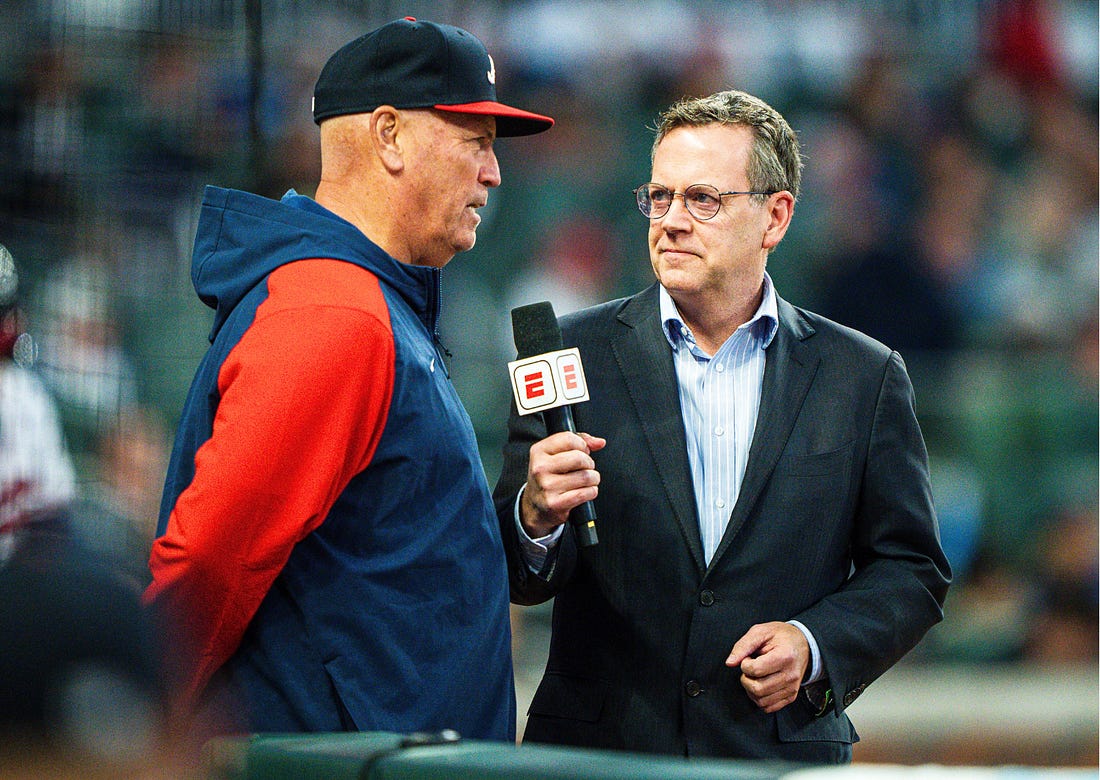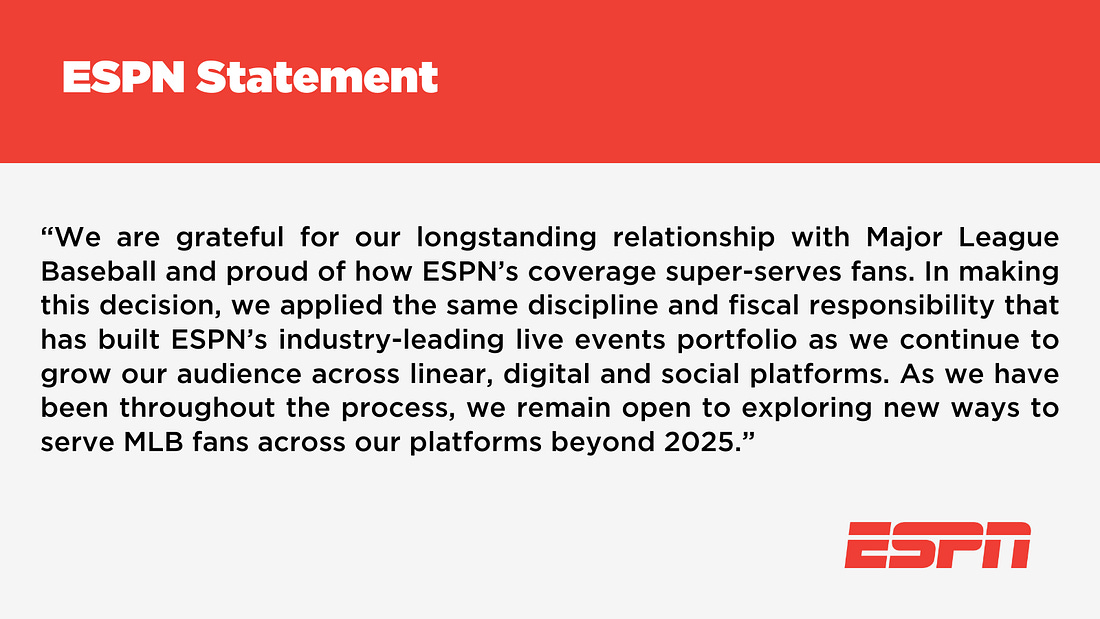Why ESPN ended its 35-year relationship with Major League Baseball
It’s official: Major League Baseball will no longer be on ESPN. Despite a 35-year relationship spanning several generations of baseball fans, MLB and ESPN agreed to end their national TV deal yesterday. ESPN will finish out its contract this upcoming season, but by opting out of the agreement nine days before the March 1st deadline, the final three years of a contract that would have run through 2028 will be voided. This news isn’t necessarily surprising. Things have been trending in this direction for a while. Not only did ESPN shutter its Baseball Tonight show in 2017, but the network rarely ever talks about baseball on any of its other popular daily talk shows and even reduced its inventory from about 90 games per season to 30 games per season in 2021. By exiting the agreement, ESPN will save about $1.65 billion over three years, or $550 million annually, while MLB will regain control of inventory that includes an exclusive Sunday night window, the Home Run Derby, and a Wild Card playoff round. Once the news broke, ESPN released a statement saying that the deal no longer made financial sense and would look for new ways to serve baseball fans. This PR stuff is pretty standard. ESPN spent time with MLB trying to negotiate a reduced fee, but they took the high road when it became clear that wouldn’t happen. Major League Baseball, on the other hand, did the opposite. In a letter to MLB owners obtained by The Athletic, Commissioner Rob Manfred eviscerated ESPN. Manfred mentioned that ESPN’s distribution has dropped from over 100 million homes in 2011 to 69 million homes when they signed the deal in 2021 to 53.6 million homes today. Manfred also said that MLB hasn’t been happy with the “minimal coverage” it has received on ESPN’s platforms over the last few years, ending the letter by saying it’s not “beneficial for [MLB] to accept a smaller deal to remain on a shrinking platform.” I don’t know about you, but that doesn’t sound like a partner who wants to figure out another way to work together. If you thought ESPN didn’t talk about baseball enough before this, you can guarantee they will talk about it even less now. Just ask the NHL, who left ESPN in 2005 only to resign with the network in 2021 after ESPN spent 16 years largely acting like the sport didn’t exist on its wide range of channels and shows. This is how it works at ESPN. They know they are the most popular sports entity in the United States, and they act like it. Sure, ESPN still spends billions annually on media rights deals with the NFL, college football, and the NBA, but they know they have a powerful marketing channel and expect secondary sports leagues to pay for it. Many MLB fans are celebrating the divorce. In some sense, I get it. ESPN wasn’t committed to marketing baseball like MLB wanted. Sunday Night Baseball is also often filled with more interviews than radio row at the Super Bowl, and it’s not like the Sunday Night Baseball audience is massive, either, at an average of 1.51 million viewers. MLB can easily replicate that audience or maybe even beat it by moving ESPN’s games to a broadcast channel with more distribution. Perhaps that happens; it seems unlikely that Rob Manfred would publicly badmouth ESPN without a backup plan. It’s just unclear who that backup plan might be at the moment. Given the mix of broadcast and streaming distribution, a deal with NBC/Peacock makes a lot of sense. However, ESPN’s $550 million per year price tag is probably a non-starter. Comcast just agreed to pay the NBA $2.5 billion annually starting next year, and they weren’t even willing to renew their Sunday morning MLB package for $30 million per year. That price is also probably too rich for Fox since they already pay MLB over $725 million annually. MLB also devalued its media rights when it signed discounted streaming deals with Apple at $85 million per year and Roku for $10 million per year, so it’s unlikely Amazon or Netflix would pony up such a hefty fee at a significant premium to what their streaming competitors pay. MLB has done a great job crafting the narrative so far. Everyone is saying that they “mutually agreed” to part ways with ESPN, and many fans are even calling it a win for Manfred and baseball due to ESPN’s lack of interest in covering the sport. However, the reality is that MLB didn’t want this to happen; ESPN gave them no other option. ESPN told MLB they wanted to pay less for their games or receive more inventory to dilute the price. That makes sense — ESPN currently pays $550 million per year for 30 regular season games, the Home Run Derby, and a Wild Card series, while Fox pays just $175 million more but gets the World Series, League Championship Series, League Division Series, All-Star Game, and a package of regular-season games. That is either a bad deal for ESPN or a great deal for Fox, maybe a bit of both. Still, MLB didn’t want to reduce its rights fee, so they said no, and ESPN decided to walk. This is somewhat of a risky decision for ESPN since 1) they are about to launch their direct-to-consumer product, and 2) they’ll have to backfill 26 slots previously occupied by Sunday Night Baseball with other content, probably more women’s basketball. Regardless, it’s doubtful MLB will be able to recoup $550 million with another partner unless they add more games to the inventory list. But then again, Rob Manfred might be willing to lose out on some money today for a more significant payday in the future. The year to watch is 2028. That’s when MLB’s deals with Fox, ESPN, and Turner are set to expire, with MLB wanting to create national packages by adding in local rights. MLB is already handling broadcasts for a handful of teams this upcoming season, and roughly two-thirds of the league’s 30 teams (if not more) are expected to have their rights available by 2028. MLB could then bundle all of those games together, without local blackouts, to maximize rights fees by signing a variety of packages, like the NBA. This is an incredibly valuable asset because while MLB doesn’t have the same viewership numbers as the NFL or even the NBA, it offers potential TV partners a ton of inventory throughout the summer, the slowest part of the sports calendar. MLB would prefer to maximize rights by selling these packages to a mix of cable, broadcast, and streaming companies. But one name to watch out for is Apple TV. Apple has not indicated interest in acquiring a larger package of MLB games. However, we know Apple is more interested in owning leagues than renting games. Think about what they did with Major League Soccer. Outside a handful of special situations, Apple TV is the exclusive home to all MLS content. That obviously includes all of the games, but the exclusive aspect of the deal also allows Apple to create a hub for everything MLS, including player interviews, facility tours, and more. The initial concern with this deal was that it would slow MLS’ growth by reducing accessibility through streaming, but that’s not a problem for MLB. Their audience is their audience. It’s a regional sport with a ton of inventory. That’s the value proposition. It’s unlikely a team like the Dodgers would agree to be part of this package, as they have a 25-year local media rights deal in place worth $8.35 billion. MLB will also have to navigate other challenges, like a new CBA with the MLBPA after the 2026 season. But don’t be surprised if a streaming company like Apple TV tries to scoop up all of MLB’s rights in 2028. We are headed in that direction anyway, and it’s much more valuable for them to own the entire schedule rather than a package of exclusive games. If you enjoyed this breakdown, share it with your friends. Huddle Up is a 3x weekly newsletter that breaks down the business and money behind sports. If you are not a subscriber, sign up and join 129,000+ others who receive it directly in their inbox each week.
You’re currently a free subscriber to Huddle Up. For the full experience, upgrade your subscription.
© 2025 |


